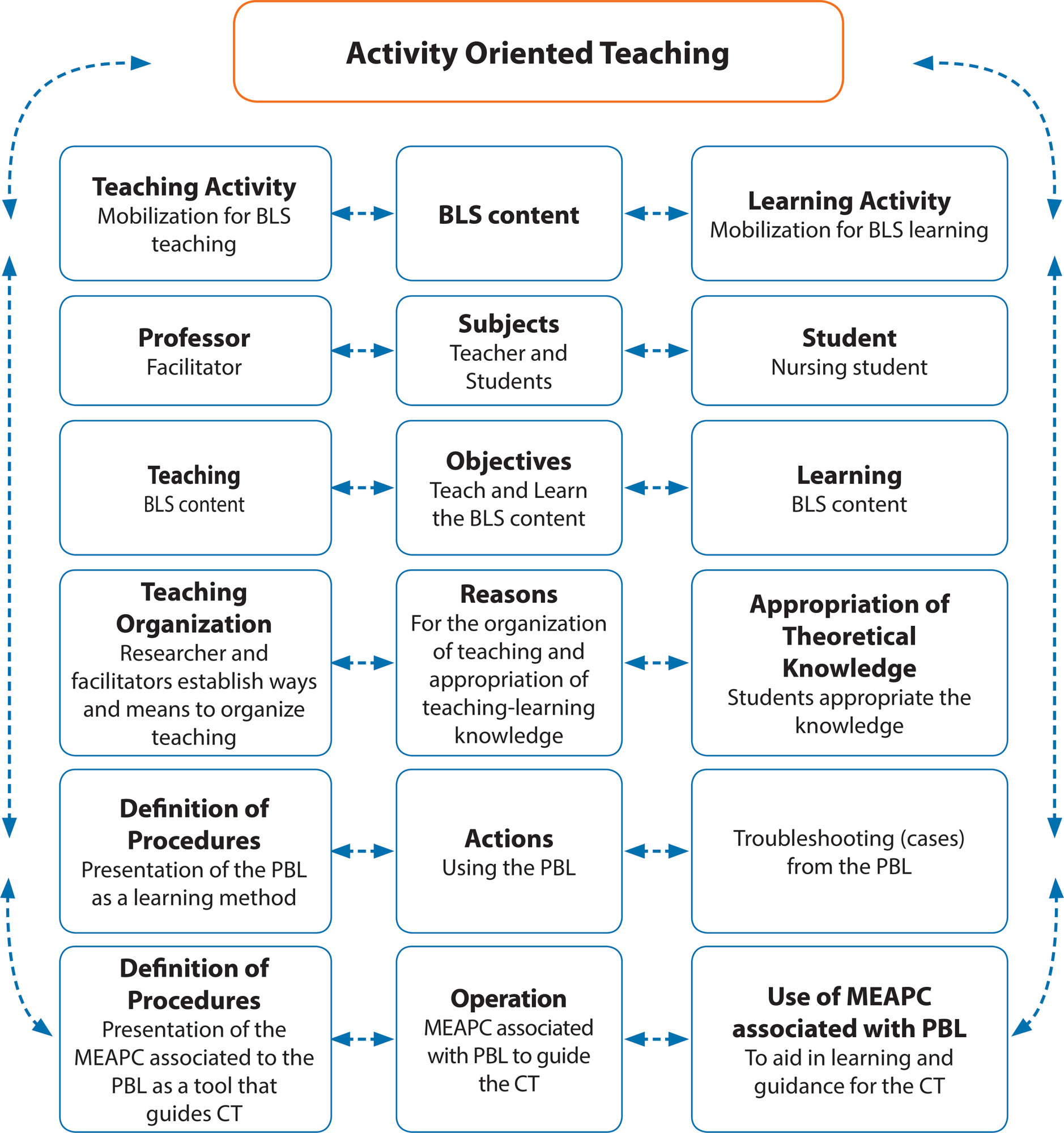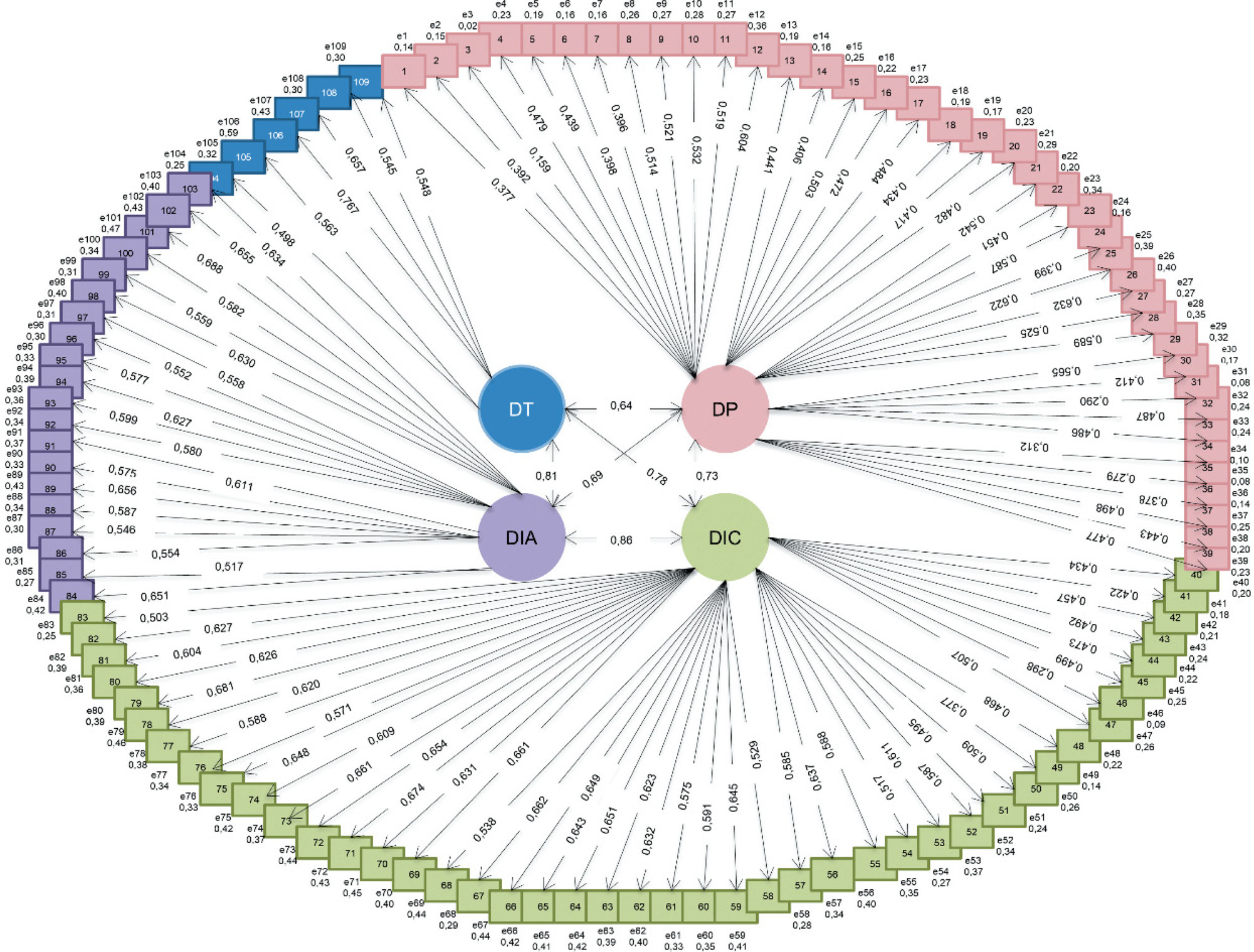-
ORIGINAL ARTICLE
Active teaching model to promote critical thinking
Revista Brasileira de Enfermagem. 2019;72(1):293-298
01-24-2019
Resumo
ORIGINAL ARTICLEActive teaching model to promote critical thinking
Revista Brasileira de Enfermagem. 2019;72(1):293-298
01-24-2019DOI 10.1590/0034-7167-2018-0002
Visualizações0Ver maisABSTRACT
Objective:
To present the experience of elaboration and implementation of the Active Teaching Model to Promote Critical Thinking (MEAPC), associated to Problem-Based Learning (PBL), for undergraduate students in Nursing.
Method:
Case report on the experience of the educational intervention (MEAPC + PBL) with undergraduate students in Nursing, in a 20-hour course on Basic Life Support (BLS). The MEAPC was validated by judges to guide the analysis of clinical cases. Critical Thinking (CT) skills were assessed using the California Critical Thinking Skills Test.
Result:
The educational intervention took place in two phases: elaboration and implementation, allowing not only the production of knowledge about BLS, but also the development of CT and exchange of experiences for teaching-learning.
Conclusion:
The association of the MEAPC to the PBL in the course of BLS organized the learning, gave opportunity to acquire knowledge and to stimulate the skills of the CT.

-
ORIGINAL ARTICLE
Clinical supervision strategies, learning, and critical thinking of nursing students
Revista Brasileira de Enfermagem. 2023;76(4):e20220691
10-09-2023
Resumo
ORIGINAL ARTICLEClinical supervision strategies, learning, and critical thinking of nursing students
Revista Brasileira de Enfermagem. 2023;76(4):e20220691
10-09-2023DOI 10.1590/0034-7167-2022-0691
Visualizações0Ver maisABSTRACT
Objective:
To identify the supervisory strategies that Nursing students consider facilitators of the development of critical thinking skills in clinical teaching.
Methods:
This is a qualitative study, within the interpretative paradigm, using the focus group methodology. Eight undergraduate nursing students participated in the study.
Results:
Participants recognized the indispensability of critical thinking for professional responsibility and quality of care and highlighted the importance of using supervisory strategies adapted to their needs, learning objectives, and the context of clinical practice.
Final considerations:
This study highlights the urgent need to establish, within the Nursing curricula, clinical supervision strategies that promote critical thinking and favor the development of skills for good clinical judgment, problem solving, and safe, effective, and ethical decision-making.
-
ORIGINAL ARTICLE
Cultural adaptation and validation of an instrument about nursing critical thinking skills
Revista Brasileira de Enfermagem. 2021;74(2):e20200720
05-28-2021
Resumo
ORIGINAL ARTICLECultural adaptation and validation of an instrument about nursing critical thinking skills
Revista Brasileira de Enfermagem. 2021;74(2):e20200720
05-28-2021DOI 10.1590/0034-7167-2020-0720
Visualizações0Ver maisABSTRACT
Objectives:
to validate the Nursing Critical Thinking in Clinical Practice Questionnaire regarding cultural aspects and metric properties.
Methods:
a methodological research carried out through cross-cultural adaptation, face and content validity, dimensional construct and known groups validity, test-retest reliability and internal consistency. 511 nurses from four hospitals participated in the study, of which 54 participated in retest.
Results:
the instrument validation for Brazilian Portuguese maintained equivalences, according to the original version. The dimensional validity demonstrated adjustment to the tetrafactorial structure of the original version (GFI=0.69). There were statistically significant differences in critical thinking skills between nurses with graduate degrees and who undertook training, reading articles, developing research and working in an institution with a longer time implementation of the Nursing Process. The instrument showed temporal stability (ICC 073-0.84; p<0.001) and adequate internal consistency (α=0.97).
Conclusions:
the instrument proved to be valid and reliable for the studied population.

-
ORIGINAL ARTICLE
Critical thinking in nursing training: evaluation in the area of competence Education in Health
Revista Brasileira de Enfermagem. 2021;74(suppl 5):e20200979
05-24-2021
Resumo
ORIGINAL ARTICLECritical thinking in nursing training: evaluation in the area of competence Education in Health
Revista Brasileira de Enfermagem. 2021;74(suppl 5):e20200979
05-24-2021DOI 10.1590/0034-7167-2020-0979
Visualizações0ABSTRACT
Objective:
To analyze the constitution of critical thinking in nursing training in the approach by competence and the integrated curriculum, considering the evaluation process by capturing its challenges, and proposing overcoming strategies.
Methods:
Qualitative. In the first phase of data collection, interviews were conducted with twenty-four professors, nine preceptors, and fifteen students to reconstruct the profile of competence, and in the second phase, a workshop to validate the profile identified challenges and proposals. The Collective Subject Discourse was used to analyze the interviews and the holistic competence reference in reconstructing the profile.
Results:
The critical thinking is built based on experiences in the world of work, and evaluation is the conductor of reflections towards emancipation.
Final considerations:
It signals the importance of professor training in the learning evaluation and working with the collective construction of subjects to overcome challenges that happen in the changes of training.
Palavras-chave: Competency-Based EducationEmployee Performance AppraisalNursesProfessional CompetenceThinkingVer mais -
ORIGINAL ARTICLE
Critical thinking in nursing students from two Brazilian regions
Revista Brasileira de Enfermagem. 2020;73(1):e20170742
02-10-2020
Resumo
ORIGINAL ARTICLECritical thinking in nursing students from two Brazilian regions
Revista Brasileira de Enfermagem. 2020;73(1):e20170742
02-10-2020DOI 10.1590/0034-7167-2017-0742
Visualizações0Ver maisABSTRACT
Objective:
To analyze the overall critical thinking and the development of each of the cognitive skills or attributes that compose it in students of the undergraduate program in nursing through the creation of concept maps in two Brazilian teaching institutions.
Method:
Before-and-after experimental study, randomized, performed in two universities of two Brazilian regions, with a sample of 21 subjects at the A school and 56 at the B school. Data were collected through sociodemographic questionnaire and the California Critical Thinking Skills Test. Intervention consisted in the creation of four concept maps.
Results:
Scores measured for overall critical thinking do not differed between the groups of both schools; however, positive aspects among them were found for skills of evaluation, induction, and inference.
Conclusion:
We perceived validity as a facilitating teaching strategy of the use of concept maps in several aspects.

-
ORIGINAL ARTICLE
Debriefing evaluation in nursing clinical simulation: a cross-sectional study
Revista Brasileira de Enfermagem. 2019;72(3):788-794
06-27-2019
Resumo
ORIGINAL ARTICLEDebriefing evaluation in nursing clinical simulation: a cross-sectional study
Revista Brasileira de Enfermagem. 2019;72(3):788-794
06-27-2019DOI 10.1590/0034-7167-2018-0103
Visualizações0Ver maisABSTRACT
Objective:
Evaluate the contribution of debriefing after clinical simulations for nursing students.
Method:
Quantitative study, conducted with 35 nursing students who participated in five clinical simulation scenarios with planned debriefings based on the model of the National League Nursing/Jeffries Simulation Theory. After the fifth scenario, students answered the Debriefing Evaluation Scale associated with the Simulation.
Results:
The items evaluated involved the psychosocial, cognitive, and affective values, and within a scale from one to five, the highest mean was found in cognitive value with 4.23 (±0.56) points, then in psychosocial value with 3.77 (±0.53), and finally in affective value with 3.71 (±0.63) points.
Conclusion:
The debriefing conducted after the clinical simulation scenarios was a reflective exercise that contributed to the student integrating multiple knowledges in affective, cognitive and psychosocial values, and thus develop the competencies required.



